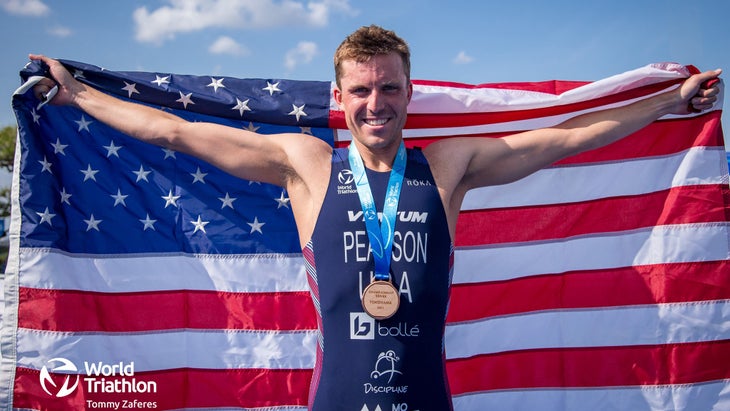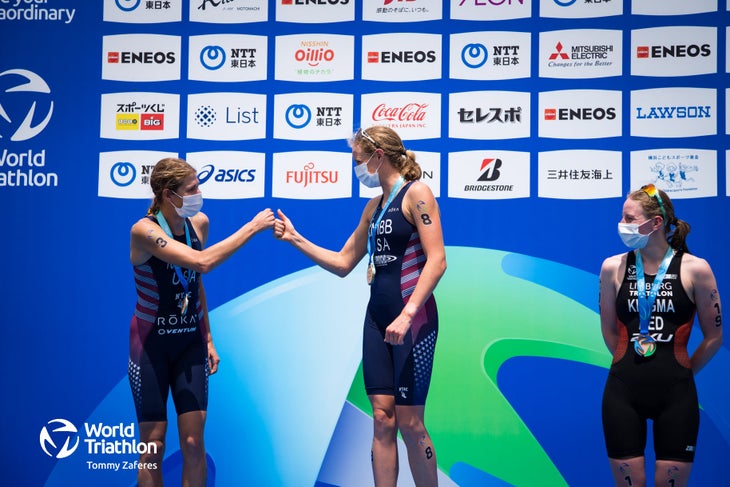New perk! Get after it with local recommendations just for you. Discover nearby events, routes out your door, and hidden gems when you sign up for the Local Running Drop.
Last Weekend Now is your Monday morning rundown of what’s happening in pro triathlon, brought to you with commentary by Brad Culp. (Ed note: So yell at him if you don’t like the comments.)
What a difference a year makes. Had the Olympics actually taken place last year, Taylor Knibb and Morgan Pearson would have been watching from home and looking ahead to 2024. Thanks to COVID, they’ll head into Tokyo as two of the biggest medal favorites. Between the relay and individual events, it’s very possible that Team USA will come back from Japan with more triathlon medals than it’s won at the previous five Olympics combined. (Which is only two.)
Not to take anything away from Knibb’s dominant victory, but let’s start with the men’s race because I get to take a quick victory lap.
RELATED: Taylor Knibb Upsets Favorites for Yokohama Win and Olympic Team
RELATED: Morgan Pearson Qualifies for Olympics with Blistering Run
The Men’s Race: Welcome to the Morgan Pearson Bandwagon

I told you so. I told everyone who would listen that Morgan Pearson would be the one to end the U.S. men’s medal drought. I told everyone I know who writes about this sport that they should be paying attention to Pearson. I told the person editing this article. I told my dog. My neighbor—who didn’t even know triathlon was in the Olympics—now knows about Pearson. I hyped him up so much on Twitter that multiple people asked if he was paying me. (He is not.)
The good news is there’s plenty of room on the Morgan Pearson bandwagon. Everyone is welcome. As the triathlon public and the actual public get to know him, I think he’ll become one of the most popular athletes in the sport. His reputation among the Boulder elite running community is legendary. He trains like an absolute maniac and can handle workouts that would make most triathletes crumble. He is incredibly confident without coming off as cocky. He speaks very highly of his competitors, especially Vincent Luis, who he beat for the first time on Saturday. And, according to multiple Instagram replies, he’s a certified man rocket. Unfortunately for the women of the gram, he’s taken, but good-looking champions never hurt a sport.
Of course, he still has a long way to go and he would be the first to tell you that. He didn’t even win on Saturday. In fact, he got his ass kicked by Norway’s Kristian Blummenfelt, another athlete Pearson has looked up to since he made the jump from running in 2017. Blummenfelt is the ultimate win-or-DNF kind of athlete. On Saturday, he went full throttle from the start of the run, and he was able to hang on to finish 10 seconds ahead of Belgian Jelle Geens, whose name does not rhyme with “jelly beans,” unfortunately for all of us. Pearson was another seven seconds back, just ahead of fellow runner-turned-triathlete Alex Yee of Great Britain. All of the top five men ran under 30 minutes for 10K, with Blummenfelt turning in a blistering 29:26 split to lead the way.
Yee is a good problem for Great Britain to have. He gives them a legitimate medal shot and is undoubtedly their best option to anchor the relay. But selecting him will likely come at the expense of two-time reigning gold medalist Alistair Brownlee, who did not compete this weekend. Barring a huge performance at his hometown race in Leeds on June 5, it’s likely we’ll have an Olympic triathlon without the older Brownlee for the first time since 2004. Jonathan Brownlee has already qualified for Team GB and it’s looking increasingly unlikely that the Brits will get a third spot for the men.
Leeds will also decide the two remaining men’s spots for the U.S., as Pearson is the only one to auto-qualify and it’s looking increasingly likely that there will be three American men on the start line in Tokyo. Kevin McDowell continues to trend in the right direction, finishing 11th in Yokohama, which is his best World Triathlon Series finish to date. Matt McElroy was the top U.S. male pre-COVID, winning a pair of World Cups to end the 2019 season, but he’s finished 33rd and 24th in his last two WTS races. The race in Leeds between McDowell, McElroy and longshot Eli Hemming (who DNF’d in Yokohama after a mechanical) should be intense.
The Women’s Race: A New Gold Medal Favorite

Now let’s talk about the star of the weekend, and the woman who just threw a wrench in the plans of all the other women who thought they were gold medal favorites. Taylor Knibb is the only athlete—female or male—who has the horsepower to actually make the bike matter in Tokyo. The old adage from a disgraced former cyclist/triathlete that draft-legal racing is just a “shampoo, blow-dry, and 10K foot race” is mostly true—unless Knibb is racing.
On Saturday, she rode two minutes and 20 seconds faster than runner-up Summer Rappaport, who punched her Tokyo ticket at the Test Event 640 days ago. Nobody rides nearly two and a half minutes faster than the runner-up at a World Triathlon/ITU/whatever-you-want-to-call-it race. That hasn’t happened since the early-2000s, when they actually raced on challenging bike courses.
While Yokohama lacked hills, it was a very technical course and it’s similar to what we’ll see in Tokyo. Pack riding is great when you’re trying to save your legs for the run, but when there’s a lot of braking and accelerating, sometimes it pays to be out front, where you can just let it wheel. Especially if you can ride a bike like Knibb or third-place finisher Maya Kingma of the Netherlands, who has an awesome name and can really ride a bike.
Kingma and Knibb will be far and away the strongest riders in Tokyo. If they can work together as well as they did on Saturday, they could all but end the race for gold before the run even starts. But they’ll also be marked women after what they did this weekend. The pack will work harder to limit the deficit, and Knibb will likely have to run faster than her 35:09 split to win gold.
Rappaport ran a minute and 45 seconds faster than Knibb in her runner-up effort, but still finished 30 seconds back. Taylor Spivey’s fourth-place didn’t auto-qualify her for the Olympic team, because the U.S. women’s team is insanely competitive. That put three U.S. women in the top four, and it means there’s just one Olympic spot left and three very fast American women vying for it.
Spivey finished just off the podium on Saturday; Kirsten Kasper crossed the line in 14th; and 2019 world champ Katie Zaferes finished back in 22nd. All three have proven to be valuable relay pieces and medal contenders on their best days. It’s hard to imagine leaving Spivey off the team after what she’s done over the past year, but it’s also hard to imagine leaving a world champion off the team. It will all come down to who performs best in Leeds. And it will be decided by the first truly tough discretionary pick USA Triathlon’s selection committee has had to make.
Next up for World Triathlon is the mixed relay qualification event held in conjunction with the Lisbon World Cup on May 21. It’s a last-chance race for countries who have not already qualified a relay for the Games. Those who are instead still fighting for individual Olympic berths will all be headed to Leeds on the first weekend of June, while some North American athletes who have auto-qualified, like Pearson, Knibb and Rappaport, may opt for the Huatulco World Cup in Mexico the following weekend as a final Olympic tune-up. Stay tuned.
